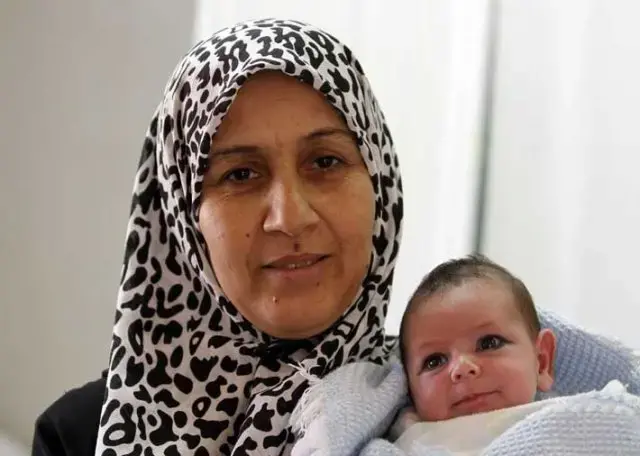The United Nations Population Fund (UNFPA) in Jordan provides technical and financial support to government and non-governmental partners to address reproductive health, gender-based violence prevention and response, and youth issues, while working on capacity building and empowerment of the service providers to provide high quality services.
UNFPA Jordan has been active from the onset of the Syrian crises to respond to the needs of the Syrians both in the communities and the established camps, as well as other affected population. UNFPA Jordan scaled up its programs to cover the needs of vulnerable populations with a goal of minimizing maternal and neonatal morbidity and mortality, as well as reduce and mitigate the risks and consequences of GBV.
As part of its humanitarian programme, UNFPA works with national and international partners to provide services for three specific components:
- Providing reproductive health services and promoting reproductive rights
- Supporting Gender based violence prevention and response
- Promoting healthy life styles, involving and responding to the needs of young people.
Which areas UNFPA Jordan's humanitarian programme focusing on?
1. Coordination: reproductive health, gender-based violence and youth
UNFPA chairs the national reproductive health sub-working group, and co-chairs the national gender based violence (GBV) sub-working group. Also, In Za'atri , UNFPA co-chairs the youth task force, and reproductive health sub-working group.
Through these working groups, UNFPA coordinates the work of different national and international actors working in reproductive health and gender based violence (GBV) prevention and response. UNFPA takes the lead in assessing the situation and identifying the gaps related to its mandate, and works closely with other partners to address the needs.
UNFPA participates in other coordination groups such as the health, health sector strategic advisory group, camp management, non-food item distribution, protection and security working groups to ensure the specific needs of women and young people are taken into consideration by other stakeholders and addressed strategically.
2. Capacity building: reproductive health, gender-based violence prevention & response and youth
UNFPA provides continuous technical support and capacity building for reproductive health service providers on Minimum Initial Service Package (MISP), national reproductive health protocols, Clinical Management of Rape (CMR) and referral pathways.
UNFPA is one of the leading agencies working to ensure humanitarian actors in the field are trained on gender based violence)GBV(. Service providers, religious and community leaders are trained on prevention and response to gender based violence )GBV( including: survivor-centered case management, psychosocial, medical and legal support to gender based violence )GBV( survivors, and gender based violence )GBV( standards operating procedures (SOPs).
Also, UNFPA supports in building the capacities of different organizations and institutions working with young people in humanitarian settings to qualify young trainers in the camps and communities.
3. Provision of services: reproductive health, GBV prevention and response
A. Reproductive health, and reproductive rights promotion: 27 reproductive health clinics established
UNFPA supports reproductive health clinics providing antenatal care, postnatal care, deliveries (one clinic in Za'atari camp), family planning, education, one to one counseling, awareness sessions, sexually transmitted infection management, clinical management of rape, and referral services. UNFPA provides reproductive health education on family planning, health-related messages on early pregnancies, hygiene issues, breastfeeding, and awareness on available reproductive health services.
UNFPA static and mobile clinics provide reproductive health care to 2000 beneficiaries per week. Each month, around 100 babies are born in UNFPA clinics in Za'atari.
B. Gender based violence (GBV) prevention and response: 17 safe spaces (8 camps-based)
UNFPA's safe spaces are at the core of its GBV prevention and response strategy. In these spaces, women and girls meet, develop networks and learn about their rights and essential life skills, as well as access specialized GBV services when needed.
UNFPA supports the provision of safe, confidential and survivor-centered case management that support GBV survivors to access quality multi-sectoral (medical, psychosocial, legal and security) services according to the survivors needs and preferences.
UNFPA also provides comprehensive psycho-social support to women and girls through access to counseling, support groups, and recreational activities. UNFPA implements GBV prevention activities including: raising awareness on GBV issues, community mobilization, outreach, and youth engagement.
Each week, 3000 women and girls access UNFPA supported safe spaces. In 2013, direct response services were provided to over to 1000 GBV survivors.
C. Young girls and boys (15-24 years)
UNFPA designed and implemented activities for young people (males and females) aged 15-24 years old in the camps and within the host community. UNFPA also work on addressing the needs of young people by promoting healthy life styles, and Y-Peer education approach, and raising their awareness on main topics related to young people, especially in humanitarian settings. The main topics include basic hygiene skills, how to prevent possible sexual and physical abuse, early marriage.
4. Supply provision: reproductive health kits and equipments
UNFPA provides emergency reproductive health kits and contraceptives to the Ministry of Health and all non-governmental partners providing reproductive health services in Jordan. These pre-packaged reproductive health kits contain essential drugs, equipment and supplies notably medicine for the treatment of sexually transmitted diseases (STIs), contraception methods including condoms, intra-uterine devices, contraceptive pills and injectables, and delivery kits. Post-rape kits that include post-exposure prophylaxis (PEP) for the prevention of the transmission of HIV are provided to the facilities ready to provide clinical management of rape (CMR). UNFPA also provides other reproductive health equipment and ambulances


